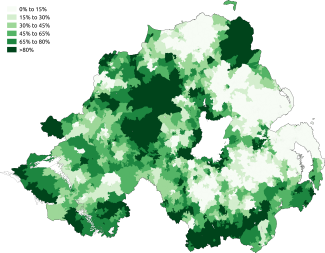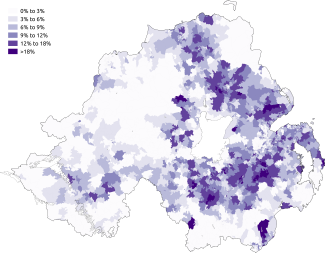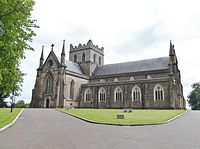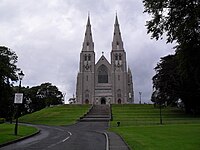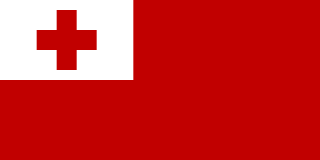Statistics

The 2001, 2011, and 2021 Census figures for Religion (not Religion or Religion Brought Up In) are set out below.
| Religion | 2001 [2] | 2011 [3] [4] | 2021 [5] | |||
|---|---|---|---|---|---|---|
| Number | % | Number | % | Number | % | |
| Catholic | 678,462 | 40.2 | 738,033 | 40.8 | 805,151 | 42.3 |
| Presbyterian | 348,742 | 20.7 | 345,101 | 19.1 | 316,103 | 16.6 |
| Church of Ireland | 257,788 | 15.3 | 248,821 | 13.7 | 219,788 | 11.5 |
| Methodist | 59,173 | 3.5 | 54,253 | 3.0 | 44,725 | 2.4 |
| Other Christian | 102,221 | 6.1 | 104,380 | 5.8 | 130,385 | 6.9 |
| (Total non-Catholic Christian) | 767,924 | 45.6 | 752,555 | 41.6 | 711,001 | 37.4 |
| (Total Christian) | 1,446,386 | 85.8 | 1,490,588 | 82.3 | 1,516,152 | 79.7 |
| Other religion | 5,028 | 0.3 | 14,859 | 0.8 | 25,524 | 1.3 |
| No religion | 233,853 | 13.9 | 183,164 | 10.1 | 330,983 | 17.4 |
| Religion not stated | 122,252 | 6.8 | 30,529 | 1.6 | ||
| Total population | 1,685,267 | 100.0 | 1,810,863 | 100.0 | 1,903,188 | 100.0 |
As of the 2021 Census, regarding religious background, four of the six traditional counties had a Catholic majority and two had a Protestant majority. [6]
| Religion or religious background of Northern Ireland residents by county | ||||||
|---|---|---|---|---|---|---|
| Religion / religion of upbringing | Antrim | Armagh | Londonderry | Down | Fermanagh | Tyrone |
| Catholic | 40.1% | 58.2% | 61.3% | 32.3% | 58.8% | 66.5% |
| Protestant and other Christian | 47.0% | 34.0% | 32.5% | 53.5% | 35.5% | 28.9% |
| Other religions | 2.1% | 1.2% | 0.9% | 1.5% | 1.1% | 0.6% |
| No religion nor religious upbringing | 10.8% | 6.7% | 5.3% | 12.7% | 4.6% | 4.0% |
The religious affiliations in the local authority districts (themselves not merged since 2011" of Northern Ireland were as follows:
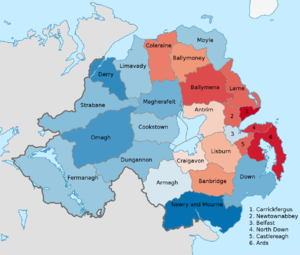
| District | 2001 [7] | 2011 [8] | ||||
|---|---|---|---|---|---|---|
| Catholic | Protestant and other Christian | Other | Catholic | Protestant and other Christian | Other | |
| Antrim | 35.2% | 47.2% | 17.6% | 37.5% | 43.2% | 19.2% |
| Ards | 10.4% | 68.7% | 20.9% | 10.9% | 65.4% | 23.6% |
| Armagh | 45.4% | 45.5% | 9.1% | 44.8% | 43.0% | 12.2% |
| Ballymena | 19.0% | 67.8% | 13.3% | 20.4% | 63.3% | 16.3% |
| Ballymoney | 29.5% | 59.1% | 11.3% | 29.6% | 56.7% | 13.6% |
| Banbridge | 28.6% | 58.7% | 12.7% | 29.4% | 55.3% | 15.3% |
| Belfast | 42.1% | 40.3% | 17.5% | 41.9% | 34.1% | 24.0% |
| Carrickfergus | 6.5% | 70.4% | 23.1% | 7.6% | 67.2% | 25.2% |
| Castlereagh | 15.8% | 64.9% | 19.3% | 19.5% | 57.3% | 23.2% |
| Coleraine | 24.1% | 60.5% | 15.4% | 25.0% | 56.8% | 18.2% |
| Cookstown | 55.2% | 38.0% | 6.8% | 55.1% | 34.0% | 11.0% |
| Craigavon | 41.7% | 46.7% | 11.6% | 42.1% | 42.1% | 15.8% |
| Derry | 70.9% | 20.8% | 8.4% | 67.4% | 19.4% | 13.1% |
| Down | 57.1% | 29.2% | 13.7% | 57.5% | 27.1% | 15.4% |
| Dungannon | 57.3% | 34.9% | 7.7% | 58.7% | 29.8% | 11.5% |
| Fermanagh | 55.5% | 36.1% | 8.4% | 54.9% | 34.3% | 10.8% |
| Larne | 22.2% | 61.9% | 15.9% | 21.8% | 59.7% | 18.5% |
| Limavady | 53.1% | 36.1% | 10.7% | 56.0% | 34.3% | 9.7% |
| Lisburn | 30.1% | 53.6% | 16.4% | 32.8% | 47.9% | 19.3% |
| Magherafelt | 61.5% | 32.0% | 6.5% | 62.4% | 28.3% | 9.3% |
| Moyle | 56.6% | 33.8% | 9.6% | 54.4% | 32.3% | 13.3% |
| Newry and Mourne | 75.9% | 16.4% | 7.7% | 72.1% | 15.2% | 12.7% |
| Newtownabbey | 17.1% | 64.5% | 18.4% | 19.9% | 57.8% | 22.3% |
| North Down | 10.0% | 64.5% | 25.5% | 11.2% | 60.3% | 28.5% |
| Omagh | 65.1% | 26.3% | 8.6% | 65.4% | 24.8% | 9.8% |
| Strabane | 63.1% | 30.9% | 6.0% | 60.1% | 30.7% | 9.2% |
Religions broken down by place of birth in the 2011 census. [9]

| Place of birth | Catholic | Protestant and other Christian | Other religion | None or not stated |
|---|---|---|---|---|
| Northern Ireland | 88.7% | 92.9% | 49.7% | 81.1% |
| England | 2.6% | 3.2% | 6.9% | 6.7% |
| Scotland | 0.5% | 0.9% | 1.1% | 1.6% |
| Wales | 0.1% | 0.1% | 0.4% | 0.3% |
| Republic of Ireland | 3.3% | 1.1% | 1.8% | 1.6% |
| Other EU: Member countries prior to 2004 expansion | 0.4% | 0.3% | 1.0% | 1.4% |
| Other EU: Accession countries 2004 onwards | 3.1% | 0.3% | 1.8% | 3.5% |
| Other | 1.4% | 1.1% | 37.3% | 3.8% |
The religious affiliations in the different age bands in the 2011 census were as follows: [10]
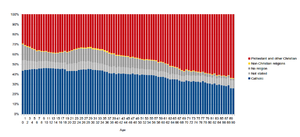
| Ages attained (years) | Catholic | Protestant and other Christian | Other religion | None or not stated |
|---|---|---|---|---|
| 0 to 4 | 44.3% | 31.7% | 0.9% | 23.2% |
| 5 to 9 | 45.5% | 36.1% | 0.7% | 17.7% |
| 10 to 14 | 45.9% | 37.9% | 0.6% | 15.6% |
| 15 to 19 | 44.8% | 37.6% | 0.6% | 17.0% |
| 20 to 24 | 43.4% | 35.2% | 0.7% | 20.7% |
| 25 to 29 | 44.8% | 33.1% | 1.1% | 21.0% |
| 30 to 34 | 44.0% | 34.3% | 1.4% | 20.3% |
| 35 to 39 | 41.5% | 37.8% | 1.2% | 19.5% |
| 40 to 44 | 40.4% | 41.1% | 0.9% | 17.7% |
| 45 to 49 | 40.0% | 42.8% | 0.8% | 16.3% |
| 50 to 54 | 39.2% | 44.9% | 0.7% | 15.1% |
| 55 to 59 | 38.1% | 46.5% | 0.8% | 14.6% |
| 60 to 64 | 35.8% | 50.0% | 0.7% | 13.4% |
| 65 to 69 | 33.7% | 54.4% | 0.7% | 11.2% |
| 70 to 74 | 32.9% | 56.4% | 0.7% | 10.1% |
| 75 to 79 | 32.0% | 58.1% | 0.6% | 9.3% |
| 80 to 84 | 30.0% | 60.0% | 0.6% | 9.3% |
| 85 to 89 | 28.1% | 61.8% | 0.5% | 9.6% |
| 90 and over | 25.8% | 64.0% | 0.5% | 9.6% |
Graphs are unavailable due to technical issues. There is more info on Phabricator and on MediaWiki.org. |
There was a high level of non-enumeration during the 1981 census, mainly due to protests in Catholic areas regarding the 1981 Irish hunger strike. [11]
